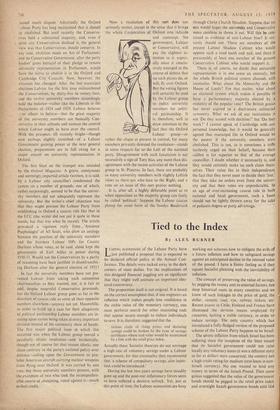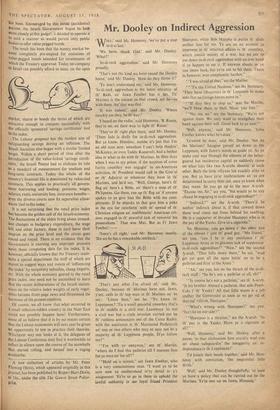Tied to the Index
By ALEX RUBNER
jFADING economists of the Labour Party have , just published a proposal that is expected to be declared official policy at the Annual Con- ference. The details were tucked away in the dark corners of most dailies. Yet the implications of this designed financial juggling are so significant that they might well animate an important elec-
toral controversy.
The proposition itself is not original. It is based on the correct assumption that, if one engineers an inflation which makes people lose confidence in the stable value of the monetary currency, one must perforce search for other measuring rods that appear secure enough to induce individuals to save. It is, therefore, suggested that the
vicious • circle of rising prices and declining savings could be broken by the issue of savings certificates whose real value would be maintained by a link with the retail price index.
Actually these Socialist theorists do not envisage a high rate of voluntary savings under a Labour government; for that eventuality they recommend that 'a scheme of compulsory savings, also index- tied, could be introduced.'
During the last two years savings have steadily gone up and the post-war inflationary forces seem to have suffered a decisive setback. Yet, just at this point of time, the Labour economists are busy working out schemes how to mitigate the evils of a future inflation and how to safeguard savings against an anticipated decline in the internal value of the pound. 1 have a funny feeling as if they equate Socialist planning with the inevitability of inflation.
The concept of preserving the value of savings, by pegging the money unit to external factors, has deep historical roots in many countries and we know of such linkages to the price of gold, the dollar, cement, coal, rye, railway tickets, etc. Recent events in Chile, Finland and France have illustrated the devious means employed by countries, lacking a stable currency, in order to induce savings. The only country which has introduced a fully-fledged version of the proposed scheme of the Labour Party happens to be Israel.
The severe inflation from which Israel has been suffering since the inception of the State meant that its Socialist government could not raise locally any voluntary loans (it was a different story so far as dollars were concerned; the country has a high credit rating for medium-term loans in non- Israeli currency). No one wanted to lend any money in terms of the Israeli Pound. Then some genius suggested that the value of the government bonds should be pegged to the retail price index and overnight Israeli government bonds sold like
hot buns. Encouraged by this initial (accidental) success, the Israeli Government began to look more closely at this gadget; it decided to operate it in such a manner as would permit only public bodies to offer value-pegged bonds.
The result has been that the money market be- came completely pre-empted for emissions of Value-pegged bonds intended for investments of which the Treasury approved. Today no company in Israel can possibly afford to issue, on the open Market, shares or bonds the terms of which are attractive enough to compete successfully with the officially sponsored 'savings certificates' tied to the index.
The Labour proposal has the modest aim of safeguarding savings during an inflation. The Israeli Socialists also began with a similar limited target. Within a short period of time after the introduction of the value-linked 'savings certifi- cates,' the Israeli Pound had to abdicate its role as a standard of measurement for medium and long-term contracts. Today the whole of the country's financial life is dominated by value-tied contracts. This applies to practically all govern- ment borrowing and lending; pensions, wages, salaries, rents, university fees, insurance benefits— even the divorce courts now fix separation allow- ances 'tied to the index.'
It is not surprising that the retail price index has become the golden calf of the Israeli economy. The fluctuations of the index bring about immed- iate changes in budgetary expenditure, the wage bill and other factors; these in turn leave their imprint on the price level and the circus goes round and round. There is no evidence that the Government is exerting any improper pressure Upon those computing data for the index. It is, however, officially known that the Treasury main- tains a special department the staff of which are Meant to suggest ways and means of 'influencing the index' by temporary subsidies, cheap imports, etc. With the whole economy geared to the retail price index, one need not be astonished to learn that the recent deliberations of the Israeli statisti- cians on the relative index weights of early veget- ables became front-page news and threatened the harmony of the present coalition.
Of course, we all know that what occurred in a small inflation-ridden country in the Near East could not possibly happen here! Furthermore, sonie of us believe that it is by no means certain that the Labour economists will next year be given an opportunity to test in practice their theories. Whichever way one looks at it, the delegates of the Labour Conference may find it worthwhile to reflect in silence upon the course of the snowballs that started rolling, and turned' into a raging avalanche.
A new collection of articles by Mr. Peter Fleming (Strix), which appeared originally in this journal, has been published by Rupert Hart-Davis, at 16s., under the title The Gower Street Polter- geist.'































 Previous page
Previous page